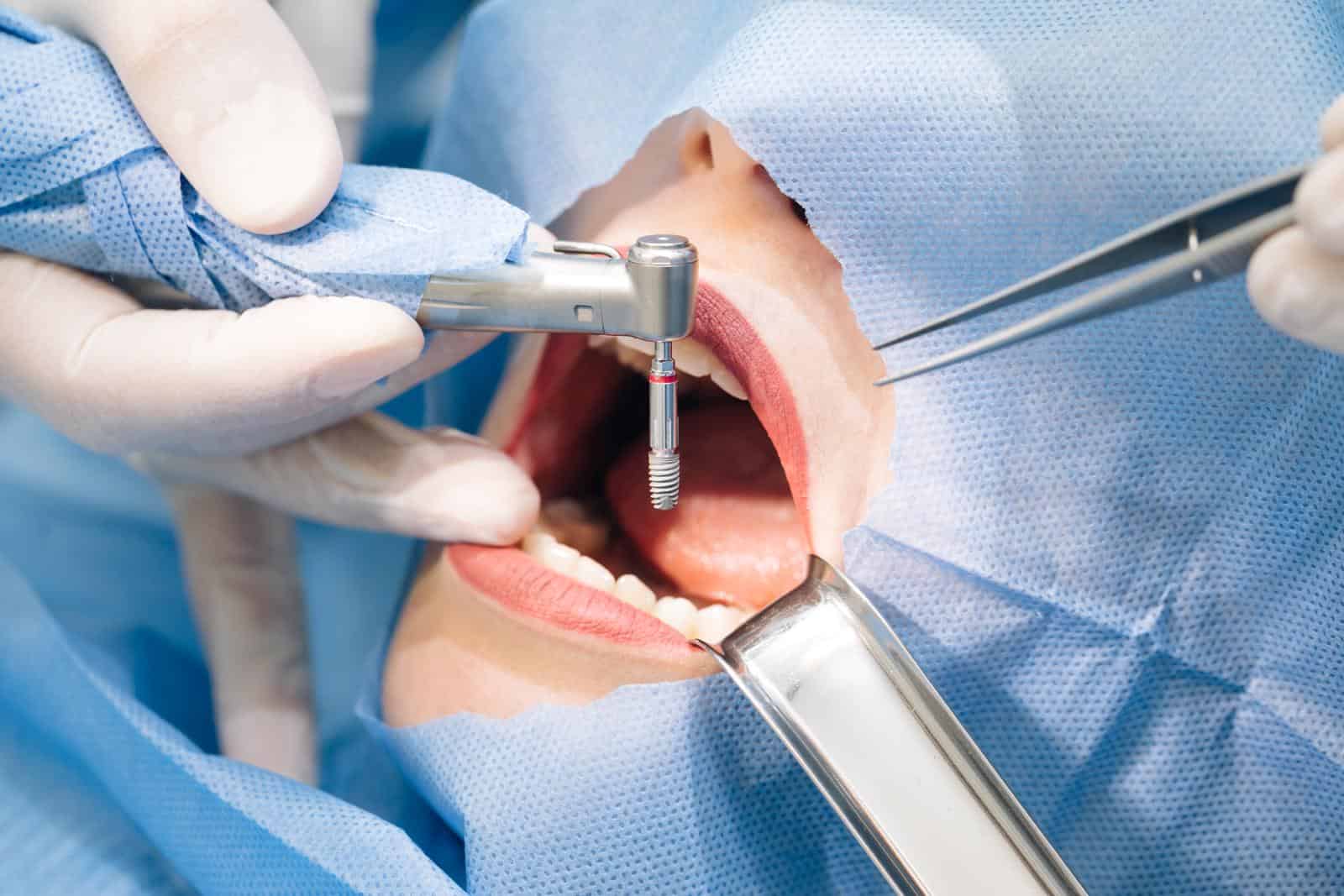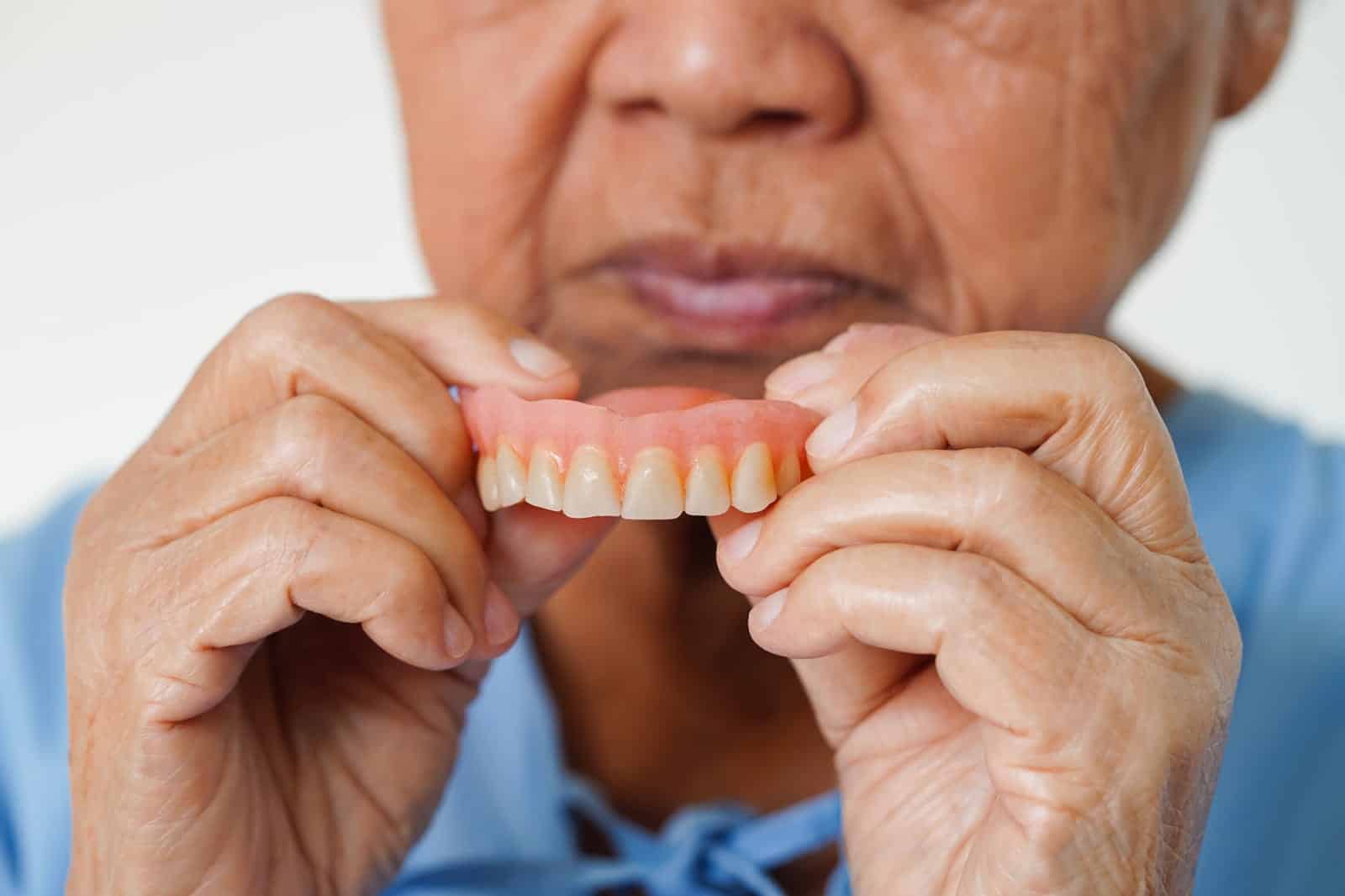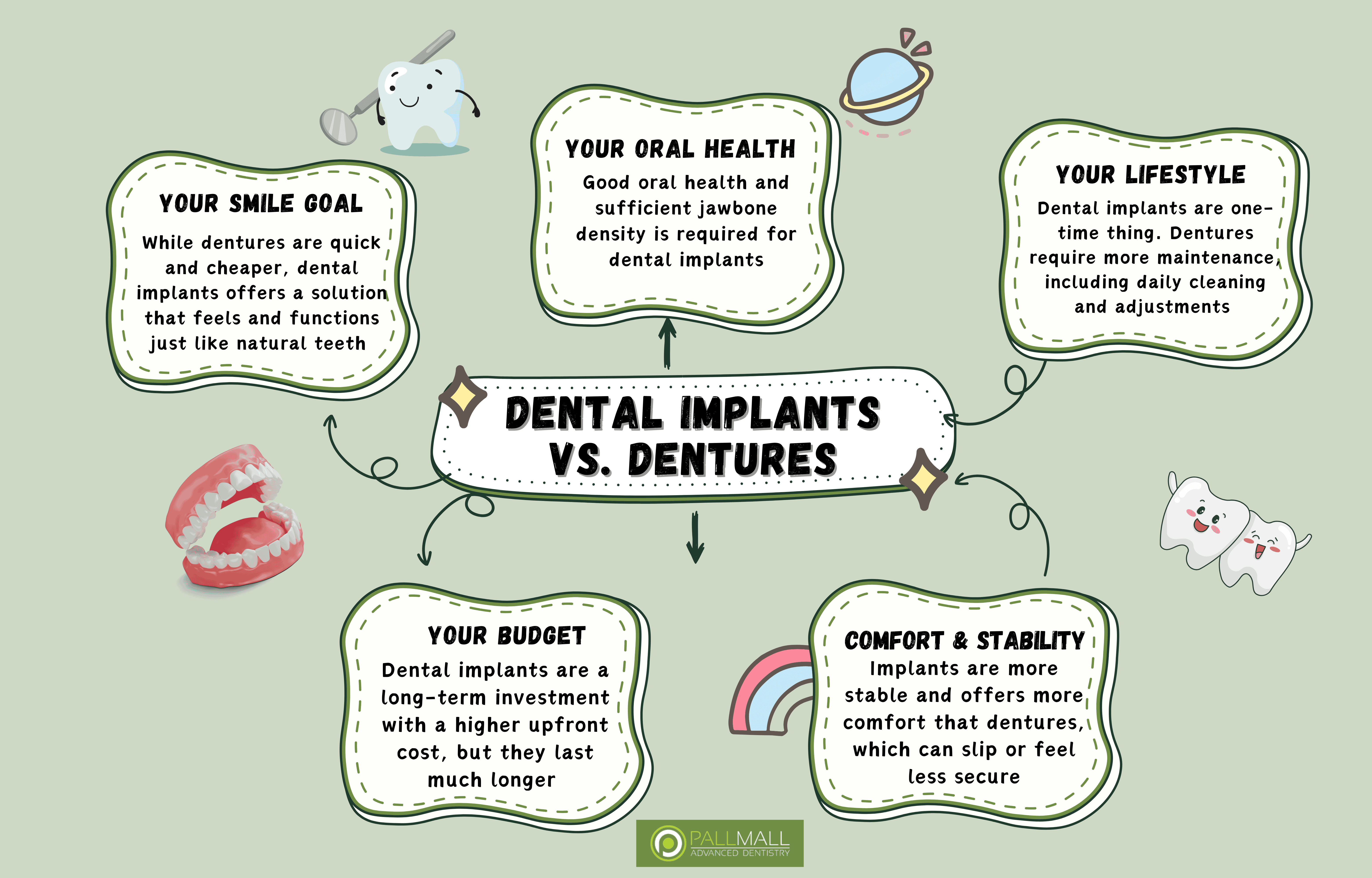When it comes to replacing missing teeth, dental implants vs. traditional dentures are two of the most popular options out there. But with so much information floating around, choosing the right one for your smile can feel overwhelming.
Should you go for the secure, long-lasting implants or the tried-and-true dentures? The answer depends on your needs, lifestyle, and what makes you feel most confident.
In this blog, I’ll walk you through both options – the pros, the cons, and everything in between – to help you make the best choice for your smile.
And remember, if you’re still unsure or ready to explore your options further, we’re here to help at Pall Mall Dental. Book your consultation today, and let’s find the perfect solution for you!
An Overview of Dental Implants
Dental implants are like the gold standard of tooth replacement – and for good reason! Imagine having a replacement tooth that feels and works just like the real thing – sounds great, right? That’s exactly what dental implants offer!
They’re tiny titanium screws placed into your jawbone to act as a sturdy foundation for a crown, bridge, or even a full set of teeth.
Implants look, feel, and function just like natural teeth, making them incredibly popular. With their durability and ability to restore confidence, it’s no wonder they’ve become a go-to choice for patients seeking a permanent solution for tooth loss.
Pros of Dental Implants
Long-Lasting Solution
Dental implants are designed to last decades – or even a lifetime – with proper care. Unlike dentures, which may need replacing every few years, implants are a one-and-done solution for most patients.
Natural Look and Feel
Implants mimic natural teeth so well that most people won’t even realise you have them. They look, feel, and function just like real teeth, giving you a smile you can be proud of.
Stability and Comfort
No slipping, no shifting. Implants are securely fixed in your jawbone, meaning you can eat, speak, and smile with confidence, without worrying about embarrassing moments.
Preserves Jawbone Health
Missing teeth can lead to bone loss over time, but implants stimulate the jawbone just like natural teeth roots, keeping it healthy and strong.
Low Maintenance
Implants don’t require any special care. Simply brush, floss, and visit your dentist regularly, just as you would with natural teeth.
Cons of Dental Implants
Higher Initial Cost:
Dental implants are an investment. While they’re more expensive upfront than dentures, their durability and long-term benefits often make them more cost-effective in the long run.
Time-Consuming Process
The process of getting dental implants isn’t instant. From consultation to final fitting, it can take several months, as the implants need time to integrate with your jawbone.
Surgical Procedure: Unlike dentures, implants require minor surgery to place the titanium screw into the jawbone. While this is a routine procedure, it may not be suitable for everyone, particularly those with certain health conditions.
Not Suitable for Everyone: Patients with insufficient jawbone density may require additional procedures like bone grafting before implants can be placed. This can increase the cost and timeline for treatment.
Dental implants offer incredible benefits for the right candidate, but they do come with considerations. Next, let’s see how traditional dentures stack up in comparison!
A Closer Look at Traditional Dentures
Traditional dentures are removable appliances designed to replace missing teeth and restore your smile. They come in different types, including full dentures for those who’ve lost all their teeth and partial dentures for those missing just a few.
Made from materials like acrylic and metal, dentures are custom-fitted to your gums for a snug and comfortable fit.
Their popularity lies in their affordability and versatility – they’re a quick and effective way to regain your ability to eat, speak, and smile with confidence.
While they’ve been around for decades, modern dentures are now more natural-looking and comfortable than ever before, making them a reliable choice for many.
Pros of Traditional Dentures
Affordable Option
Dentures are one of the most budget-friendly ways to replace missing teeth. They’re a great choice if you’re looking for a cost-effective solution.
Quick Turnaround
Unlike dental implants, dentures can be created and fitted relatively quickly, meaning you don’t have to wait months to restore your smile.
Non-Invasive
No surgery is needed! Dentures are a straightforward, hassle-free option, especially for those who may not be candidates for implants due to health or bone density issues.
Customisable for Your Needs
Whether you need full or partial dentures, they’re tailored to fit your unique requirements, making them versatile for a variety of situations.
Easily Replaceable
If dentures get damaged or worn over time, they’re relatively simple to repair or replace without too much expense.
Cons of Traditional Dentures
Lack of Stability: Dentures can slip or shift, especially while eating or speaking, which may cause discomfort or embarrassment.
Bone Loss Over Time: Unlike implants, dentures don’t stimulate the jawbone, which can lead to bone loss and changes in facial structure over time.
Higher Maintenance: Dentures require daily cleaning and regular adjustments as your gums and jawbone change, which can add to the upkeep.
Impact on Eating and Speaking: Chewing harder foods or speaking clearly can sometimes be challenging, particularly if the dentures don’t fit perfectly or lose their snugness over time.
Dental Implants vs. Traditional Dentures: Which Is Right for You?
Choosing between dental implants vs. traditional dentures is a big decision, and it depends on what works best for your unique needs. Here are some factors to consider when deciding which option is right for you:
#1: Your Smile Goal
If you’re looking for a solution that feels and functions just like natural teeth, dental implants are hard to beat. They provide a seamless, permanent fix that blends beautifully with your smile.
On the other hand, if you’re after a quick and cost-effective way to fill gaps, traditional dentures might be more your speed. Both can enhance your smile, but implants often offer the most natural results.
#2: Your Oral Health
Your overall oral health plays a big role. Dental implants require a strong jawbone to provide the stability needed, and any underlying issues like gum disease must be addressed before treatment. Dentures, however, don’t rely on your jawbone, making them a better choice if bone loss is an issue.
#3: Your Lifestyle
Consider how each option fits into your daily routine. If you want a set-it-and-forget-it solution, implants are ideal as they don’t require removal or special cleaning. Dentures, however, involve more maintenance, including daily cleaning and adjustments, and may shift during meals or conversations.
#4: Your Budget
Cost is often a deciding factor. Dental implants are a long-term investment with a higher upfront cost, but they last much longer than dentures and often require less maintenance over time.
Dentures, meanwhile, are a more affordable short-term option, though they may need replacing every few years.
#5: Comfort and Stability
Implants are known for their stability and comfort, staying securely in place no matter what you’re eating or saying. Dentures, while improved over the years, can still slip or feel less secure, especially if they don’t fit perfectly.
Ultimately, the decision comes down to what aligns with your lifestyle, health, and goals. At Pall Mall Dental, we’re here to guide you through every step of the process, so you feel confident about your choice.
Book a consultation today, and let’s find the perfect solution for your smile!
The Path to a Restored Smile Starts with the Right Choice
Both dental implants and traditional dentures are fantastic options for replacing missing teeth, but the best choice depends on your unique needs and lifestyle. By considering the factors we’ve discussed, you’ll be better equipped to decide which solution is right for you.
Of course, your dental professional is here to help! At Pall Mall Dental, we offer personalised treatment plans tailored to your needs. We’ll work closely with you to understand your goals, answer all your questions, and guide you toward the option that will leave you smiling confidently.
Ready to take the next step and decide between dental implants vs. traditional dentures? Schedule an appointment with us today, and let’s explore your options together!
Dental Implants vs. Traditional Dentures: FAQs
Are dental implants more expensive than dentures?
Yes, dental implants typically cost more upfront than dentures. However, they’re a long-term investment. Implants are designed to last for decades, while dentures may need replacing every few years.
How long does the dental implant process take?
The process can take a few months from start to finish. After placing the implant, it usually takes 3-6 months for the implant to integrate with your jawbone. Once healed, we’ll attach the abutment and crown. While it’s not the quickest solution, the results are worth the wait!
Can anyone get dental implants?
Not everyone is a candidate for dental implants, but many people are. Good oral health, sufficient jawbone density, and a commitment to maintaining oral hygiene are key factors. If you have bone loss or other conditions, we may recommend additional treatments to make implants an option for you.
Is the dental implant procedure painful?
Most patients are surprised by how comfortable the implant procedure is. We use local anaesthesia to ensure you feel no pain during the placement. After the procedure, you might experience mild soreness or swelling, but over-the-counter pain relief can manage this effectively.
Can I eat normally with either permanent dentures or dental implants?
Yes, both options allow you to eat comfortably, but dental implants provide more stability. With implants, you can enjoy all your favourite foods, including harder items like apples or nuts.
Will they affect my speech?
Both dental implants and permanent dentures can improve your speech. Implants feel like natural teeth and won’t move, giving you clear, confident speech.
Dentures can sometimes take time to adjust to, but once fitted properly, they shouldn’t affect your speech.




